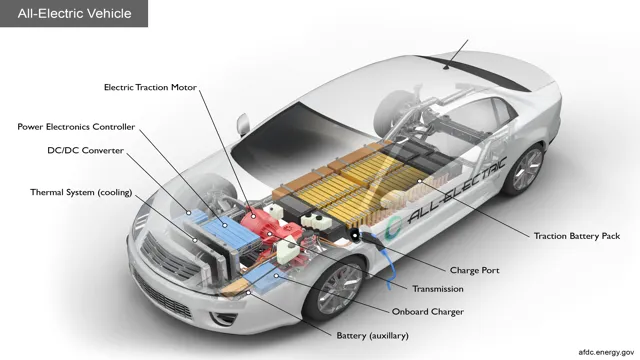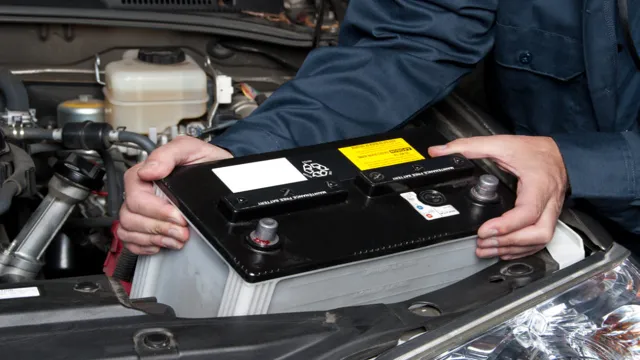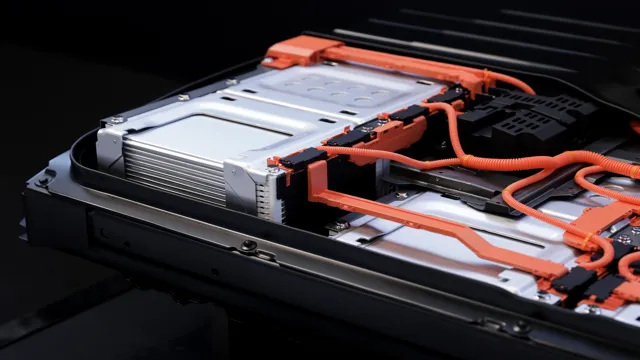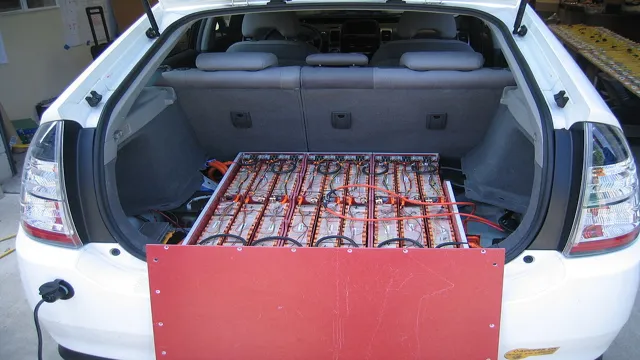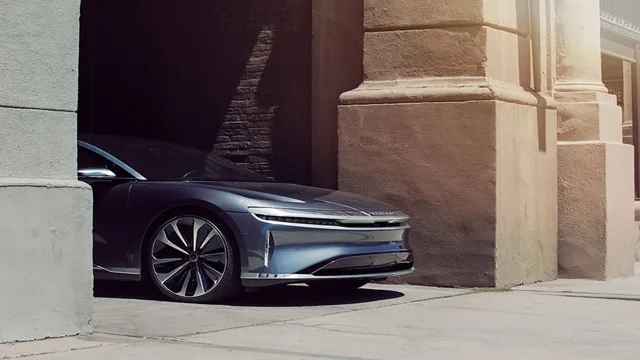Revving Up: Exploring How Electric Cars Operate Using Energy Stored in Batteries
Electric cars are the future of transportation, and they are here to stay. With the increase in oil prices and the need to reduce carbon emissions, many drivers are opting for electric cars that operate with battery energy. Battery-operated cars are ideal for eco-conscious drivers and those who want to save money on fuel.
But how do they work, and what makes them different from gasoline engines? In this blog post, we’ll explore the basics of electric car operation with battery energy, as well as how it impacts the environment and our daily lives. So, come along for the ride and let’s dive into the world of electric car technology!
How Electric Cars Work
Electric cars operate through the energy stored in their batteries. When you plug the car into a charging station, the battery fills up with electricity, just like your phone or any other device. When you turn on the car, the electricity flows from the battery to the motor, which then powers the wheels.
This is why electric cars are so quiet, as they don’t have an engine like traditional combustion vehicles. Instead, they rely on the powerful electric motor to get up to speed and maintain it on the road. So the next time you see an electric car in action, you can appreciate the amazing feat of technology that allows it to operate solely on battery power.
Electric motor and battery conversion process
One of the most important components of electric cars is the electric motor. Unlike traditional cars that use a combustion engine powered by gasoline or diesel, electric cars are powered by an electric motor and battery. The conversion process involves removing the existing engine and fuel system and replacing them with an electric motor and battery pack.
The electric motor converts electricity from the battery into mechanical energy, which spins the wheels and propels the vehicle forward. The battery pack stores the electricity that powers the motor and can be recharged by plugging into an electrical outlet or a charging station. This process of converting a traditional car into an electric vehicle is growing in popularity because it offers a more environmentally friendly and cost-effective alternative to traditional cars.
With advancements in technology, electric cars are becoming more efficient and practical for everyday use, making them a compelling choice for many car buyers.
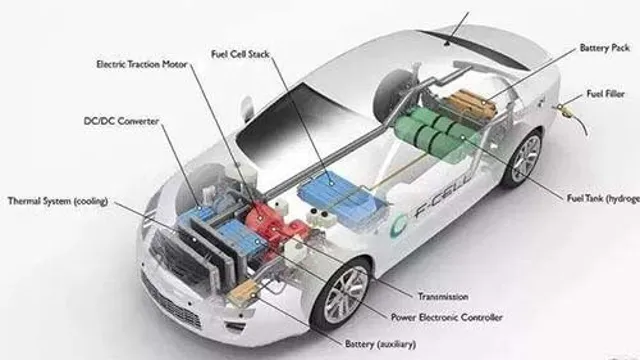
Regenerative Braking System
Electric cars are becoming increasingly popular, and one of the reasons for this is their regenerative braking system. This innovative system allows the electric car to recharge its battery while it’s braking, by converting the kinetic energy lost during braking into electrical energy that can be used to power the car’s battery. In essence, regenerative braking is the process of capturing the energy that would normally be lost during braking and using it to power the car.
This not only increases the electric car’s range, but it also helps with efficiency, making it a more sustainable option for commuters. The system works by transferring the power generated by the electric motor that slows down the car into the battery as electricity. This process reduces energy loss and prolongs battery life, making the car run longer on a single charge.
Therefore, electric cars with regenerative braking systems can offer a longer range and a more cost-effective option for eco-conscious drivers, ultimately helping to reduce carbon emissions that contribute to climate change.
Advantages of Electric Cars
Electric cars have gained popularity in recent years due to their many advantages. The cars operate on energy stored in a battery, which can be charged at charging stations or at home using a charger. One major advantage of electric cars is their energy efficiency.
Unlike gasoline-powered cars that emit pollutants during operation, electric cars produce zero emissions, making them environmentally friendly. Moreover, electric cars have lower maintenance costs as they have fewer moving parts and require less frequent maintenance. Additionally, the cost of operating an electric car is significantly lower than driving a gasoline-powered car.
This is because electric cars use electricity, which is cheaper than gasoline. The overall savings from using an electric car are often considerable. Furthermore, electric cars are quieter than gasoline-powered cars, which provide a smoother and more comfortable ride for the passengers.
Owning an electric car is a smart choice for those seeking to reduce their carbon footprint, save on fuel costs, and enjoy a comfortable and quiet ride.
Savings on Fuel Expenses
Electric cars have several advantages over traditional gasoline vehicles, one of which is saving on fuel expenses. Compared to gasoline-powered vehicles, electric cars are much cheaper to operate because they run on electricity, which is far cheaper than gasoline. This translates to significant cost savings over time.
In addition, electric cars have lower maintenance costs because they have fewer moving parts. Oil changes, spark plugs, and timing belts are not required, which means fewer trips to the mechanic, less money spent on repairs, and less hassle for the owner. Electric cars are also environmentally friendly, emitting fewer greenhouse gases than gasoline cars.
Choosing an electric car means not only saving money, but also contributing to a cleaner environment. Overall, the advantages of electric cars are numerous and make them a smart investment for anyone wishing to save on fuel expenses while also being eco-conscious.
Green Energy Benefits
Electric cars have become increasingly popular in recent years due to their numerous advantages. Firstly, electric cars are environmentally friendly and have a much smaller carbon footprint compared to their gasoline-powered counterparts. They do not emit any harmful pollutants such as carbon dioxide, nitrogen oxides, or particulate matter, which contributes to cleaner air and a healthier environment.
Furthermore, electric cars are much more efficient than gasoline-powered vehicles, using less energy to travel the same distance. This means less dependence on fossil fuels, lower fuel costs, and reduced carbon emissions. Additionally, electric cars are much quieter and smoother to drive, providing a more comfortable and peaceful driving experience.
Lastly, electric cars require less maintenance than gasoline cars due to fewer moving parts, reducing the cost of ownership. Overall, electric cars offer a more sustainable and eco-friendly alternative to traditional gasoline vehicles, making them an excellent choice for anyone wanting to reduce their carbon footprint and contribute to a cleaner planet.
Excellent Performance
Advantages of Electric Cars: Excellent Performance Electric cars are becoming more and more popular due to their numerous advantages. One of the most significant advantages of electric cars is their excellent performance. Unlike traditional cars, which rely on fossil fuels to function, electric cars use electric motors, which provide more torque and a smoother, more predictable acceleration.
This results in a more enjoyable and comfortable driving experience for the driver and passengers. Additionally, electric cars do not emit harmful pollutants, making them better for the environment and improving air quality. Furthermore, electric cars are more cost-effective as they require less maintenance and have lower operating costs.
They also have a longer lifespan than traditional cars, as electric motors have fewer moving parts, reducing the need for repairs. All in all, the excellent performance of electric cars makes them a superior choice for drivers looking for an efficient, cost-effective, and environmentally friendly alternative to traditional cars.
Challenges of Electric Cars
Operating an electric car is a fascinating experience, but it comes with its fair share of challenges. The primary challenge is managing the energy stored in the car’s battery. Batteries have been known to have a limited driving range, which can lead to range anxiety, making drivers hesitant to go on long trips.
Additionally, finding a charging station is a challenge in some areas. Drivers have to plan their routes, making sure they can reach the next charging station. Moreover, charging an electric car takes more time than filling up a gas-guzzling vehicle at a gas station, which can cause delays in travel plans.
Despite these challenges, electric cars’ benefits include zero emissions and lower fuel costs compared to gas cars, making them a greener and more economical option in the long run. As technology advances, there is hope that these challenges will slowly be resolved, making electric cars a convenient and more accessible choice for everyone to consider.
Limited Driving Range
Electric cars are becoming increasingly popular due to their eco-friendliness and cost-efficiency, but they also come with their own set of challenges. One of the biggest challenges of electric cars is their limited driving range, which can cause anxiety for drivers who are not used to planning their trips around charging stations. Unlike traditional gas-powered vehicles, electric cars need to be charged regularly, which can take anywhere from a few hours to several hours depending on the type of charging station.
Additionally, the range of electric cars varies depending on battery life and driving conditions. While some electric cars can travel up to 300 miles on a single charge, others may only have a range of around 100 miles. To overcome this challenge, manufacturers are working on improving battery technology to increase range and reduce charging times, and the charging infrastructure is constantly expanding.
Despite these challenges, many drivers still prefer electric cars for their sustainability and efficiency benefits.
Slow Charging Time
Electric cars have been hailed as the future of sustainable transportation. However, one major challenge that they face is their slow charging time. While traditional gasoline-powered cars can be refueled in a matter of minutes, electric cars take considerably longer to charge.
This can be a major inconvenience for drivers who need to cover long distances and don’t have access to a fast charging station. Additionally, slow charging times can lead to range anxiety – the fear that the car’s battery will run out of charge before reaching the destination. To tackle this challenge, automakers and charging infrastructure providers are investing in fast-charging technology.
With these innovations, electric car owners can expect to charge their vehicles in a fraction of the time it currently takes. Nevertheless, this remains a significant challenge that must be addressed to make electric cars more appealing to consumers.
Conclusion
In conclusion, electric cars are the way of the future! By utilizing energy stored in a battery, we can reduce our reliance on fossil fuels and move towards a more sustainable and eco-friendly mode of transportation. Unlike traditional cars that rely on gasoline, electric cars convert electrical energy into motion, resulting in lower emissions and a cleaner environment. Plus, with the added bonus of being able to charge your vehicle from the comfort of your own home, you can kiss those inconvenient gas station visits goodbye.
So go ahead and give your (literal) battery a boost by investing in an electric car, and let’s drive towards a brighter and greener tomorrow!”
FAQs
What is an electric car?
An electric car is a vehicle powered by an electric motor and energy stored in a battery.
How does an electric car work?
An electric car uses the energy stored in its battery to power an electric motor, which turns the wheels and propels the vehicle forward.
How far can an electric car go on a single charge?
The range of an electric car depends on the size of its battery and the efficiency of its motor. Most electric cars have a range of 100-300 miles on a single charge.
How long does it take to charge an electric car?
The time it takes to charge an electric car depends on the size of its battery and the charging speed of the charging station. Most electric cars can be fully charged in 4-8 hours using a Level 2 charger.
